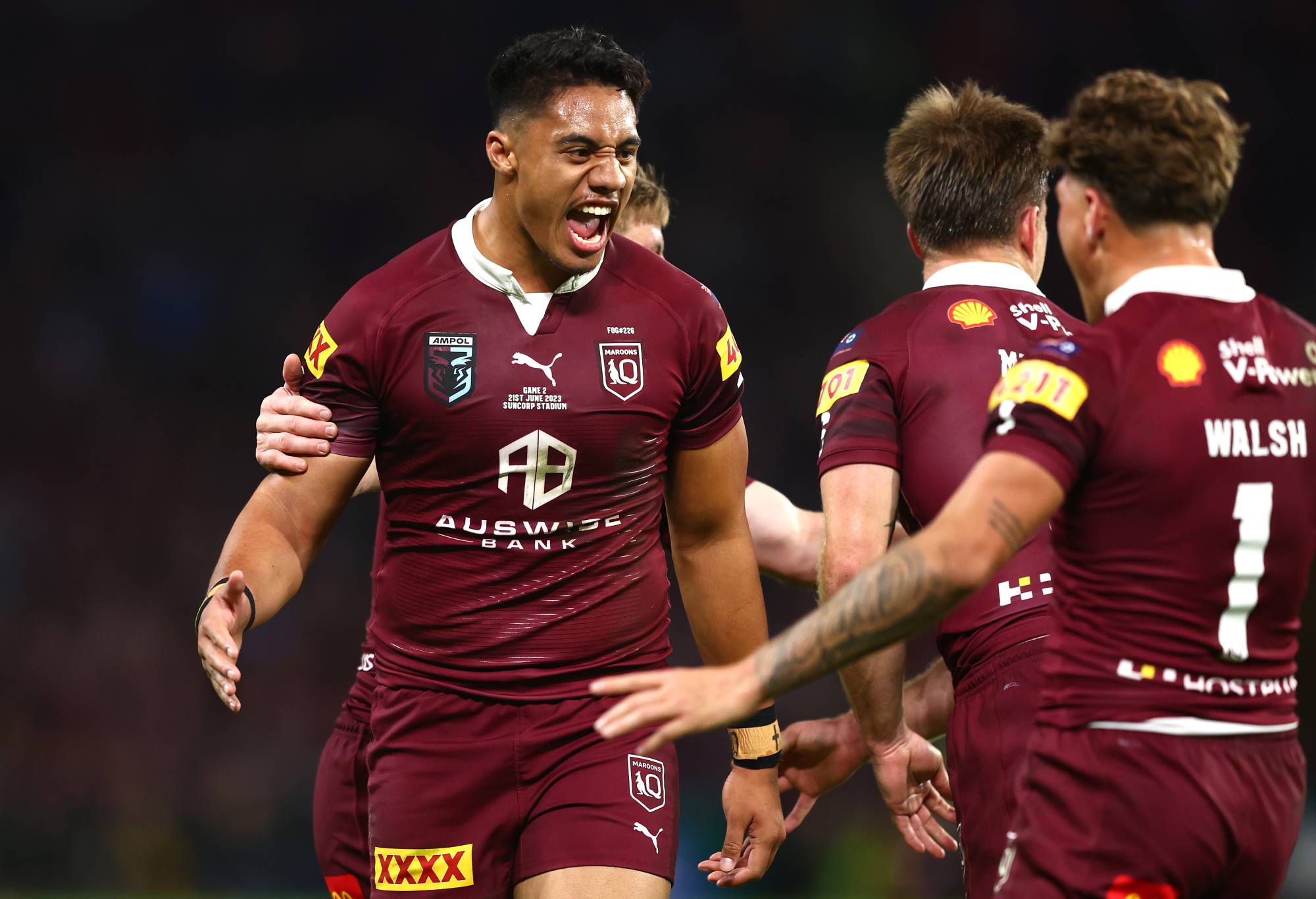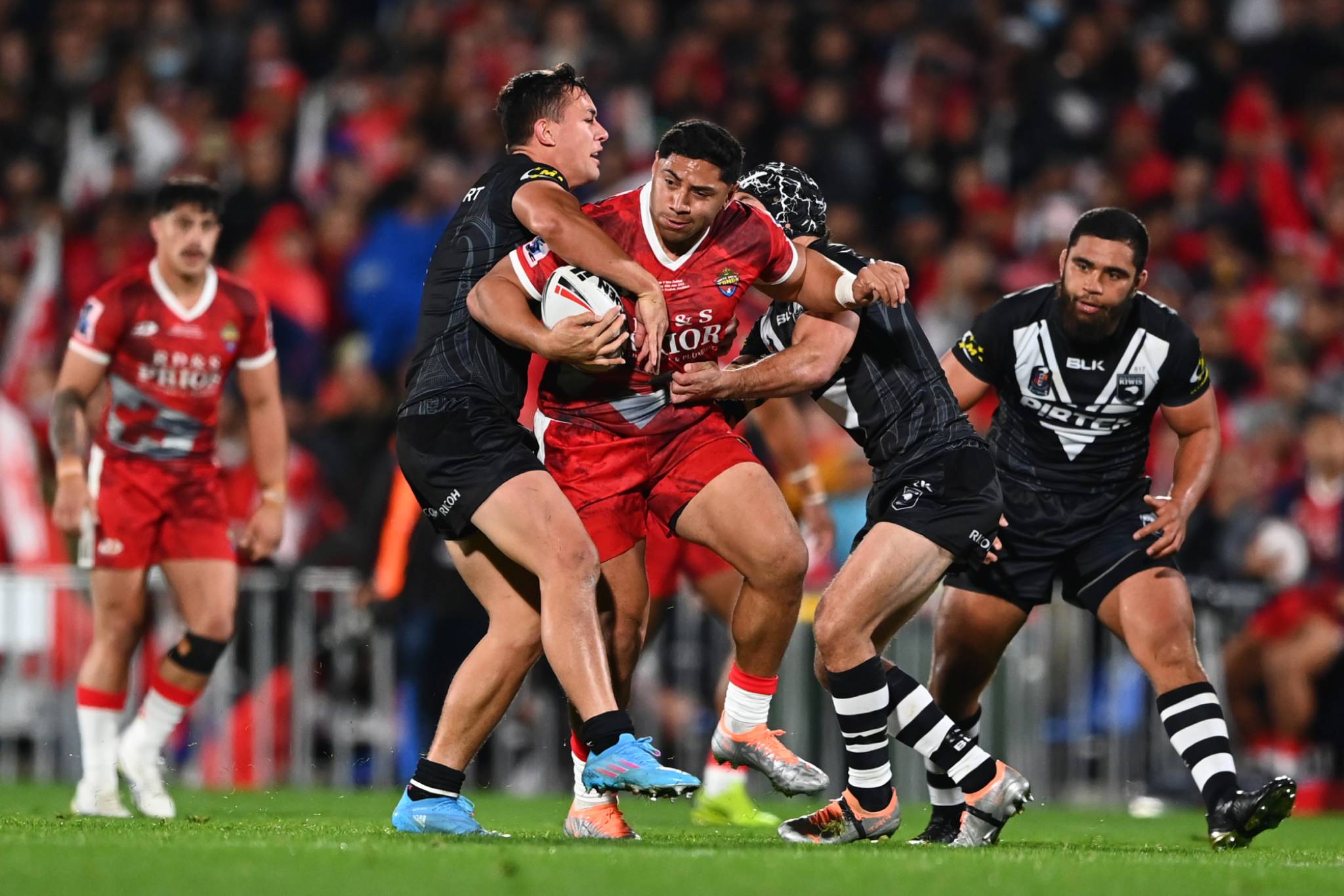Another year, another debate about who is eligible for international rugby league. This time, it was sparked by Murray Taulagi, who turned his back on the Kangaroos to represent Samoa, and will play for them against Australia this Saturday night in Townsville.
Such defections are common, and indeed, are part of the system. Players changing sides shows that it is working, because the central goal of the eligibility rule changes of 2017 was to give greater opportunities to players and to improve the talent pools of every nation on earth bar the three that have dominated rugby league since day dot.
Taulagi changing to Samoa to represent his heritage – having represented the country that raised him at last year’s World Cup – is exactly what the rules are meant to empower.
A subsection of punters thinks this is farcical – including, apparently, the Australian coach.
“I don’t believe guys should be able to go back and forth,” said Mal Meninga in an interview earlier this week.
“What I would like to see is that every player nominates which country they want to play for right from their first registration in the NRL. That way, there is no confusion around who they are eligible for.
“When they make the NRL and they have to make a tough decision on Test football, they have to make one call.”
The rules are so farcical that other sports have changed their rules to be more like rugby league.
In 2017, rugby union barred someone who had made a youth appearance for New Zealand from switching to another national team. Now, multiple former All Blacks are at the Rugby Union World Cup proudly representing Tonga.
The Dutch team at the ICC Cricket World Cup has a former South African, Roelof van der Merwe, who once played for the Proteas but is now eligible for the Netherlands, and indeed, Australia has had no qualms about picking Tim David, once of Singapore, for their team.
Even soccer, the most global sport there is, has adopted rules that are inspired by what rugby league has done: once, they also limited players to whoever they chose at 17, but now allows anyone who has played fewer than three full senior internationals to change.
International Rugby League (IRL) was at the forefront in recognising that a significant portion of its players were dual heritage and acted accordingly.
Of course, it would suit the Kangaroos coach if the old rules were reinstated. Were those rules in place, rugby league would return to being Australia 70-0 Pacific Islands overnight, or, in all likelihood, Australia would simply return to their previous policy, which was to never play the Pacific nations.
Between 1908 and 2017, Australia voluntarily – i.e. not in World Cups, when someone else did the fixtures – played Samoa once, in the 2014 Tri-Nations.
Samoa were lucky: they didn’t play Tonga at all outside of IRL-organised tournaments until the rule changes and only played Fiji once, when they were the only opposition available during the Super League War.

Murray Taulagi of the Maroons celebrates during game two of the State of Origin series between the Queensland Maroons and the New South Wales Blues at Suncorp Stadium on June 21, 2023 in Brisbane, Australia. (Photo by Chris Hyde/Getty Images)
It’s not a stretch to suggest that the only reason the Kangaroos are playing Samoa this weekend is because of the changes to eligibility rules that Mal wants changed.
When he became coach of Australia in 2016, his first team featured Semi Radradra – born, raised and currently playing rugby union for Fiji – so the purity of the talent pool clearly wasn’t a massive issue then.
Taulagi played for the Prime Minister’s XIII against PNG in Port Moresby just a few weeks ago, but crucially, that isn’t Australia.
The Australian Rugby League Commission (ARLC) could have made that game an official Test match, with caps awarded and eligibility relevant, but chose not to, as is entirely their right. It was, as far as IRL are concerned, not an international match.
Naturally, any discussion of eligibility brings about another about the tiering system that clarifies who can swap to whom.
“I believe they should consider taking away the Tier 1 and Tier 2 system,” he went on.
“Because the Pacific Nations are going to be bolstered by some great players in our NRL competition.
“So let’s take out the tiers and then every NRL player has to make one decision for the country they want to play for and stick to it.
“There’s good numbers now in the Samoa and Tonga teams. We want to see competitive Test matches and we’ve got that now.”
Not to labour the point, but those competitive matches that Mal lauds would immediately end if the tiers system were abandoned, too, because a significant portion of the Pacific players would hold their fire on representing Samoa, Tonga and other nations in the hope of a future Kangaroos call-up.
Indeed, he need only look at his own squad for examples of this: Hamiso Tabuai-Fidow was a million miles from Australian selection this time last year and couldn’t get into the Samoa team, but is now starting centre for Mal’s Kangaroos.
His other centre, Kotoni Staggs, had been defenestrated from the NSW Origin squad and was playing for Tonga, but now is in line for an Australian debut.
Had the tiers system been different, the likely results is that neither would have played for Samoa or Tonga at all, with the dual effect of killing the World Cup as a competitive prospect and robbing two young talents of international experiences that undoubtedly have made them better players.
They likely would have skipped to keep Origin eligibility, a significant career achievement as well as a bumper payday for players.
The decision to link tiering and Origin is entirely Australia’s, and nothing whatsoever to do with the IRL or international eligibility.

Jason Taumalolo charges forward for Tonga against New Zealand. (Photo by Hannah Peters/Getty Images)
Australia could declare tiers irrelevant overnight – allowing the likes of Jason Taumalolo, Victor Radley and plenty more to play – if they so chose to, so perhaps that criticism should be directed elsewhere.
The tiering is designed to separate those with developed rugby league systems across the board – i.e. Australia, New Zealaand and England – from those who don’t, and to compensate the other nations with the goal of increasing competitive balance.
Undeniably, it has worked in that goal, and continues to do so by the very fact that Samoa are playing Australia and Tonga are about to tour England.
In a later interview, Mal wound back his comments from earlier in the week, though he remains a critic of the eligibility rules.
“They’ve got some really good players, and good on them, they choose to play for Samoa,” he said.
“They could probably play for Australia, but they choose that way. And I’m really happy that they’ve done that, because that actually obviously strengthens international programs.
“We’re happy to play against a very, very competitive Samoan side because that brings out the best in the Australian side too.
“The more players playing for their ancestral nations, I think the stronger the national program will get.”
What Meninga said later on reflects an acknowledgement that the previous system resulted in Australia stockpiling talent at the expense of their opponents, to the detriment of international footy as a whole.
It also fundamentally limits the enjoyment of the international game, both for fans and players: the best thing about it is that it is a celebration of culture, and one quite unlike any other sport.
Rugby league is embedded in some of the most multicultural places on the planet and has stumbled on a way of making the limited geographic footprint of the sport into a positive.
Sydney has the fourth largest foreign-born population in the world, with Auckland ninth and Brisbane twelfth.
The north of England is a little harder to pin down, but Manchester is also in the top 50 and the region in general is incredibly diverse, especially with regards to the Irish and Jamaican communities that filled two spots at the last World Cup.
Imagine if Dom Young had written down Jamaica when he made his Super League debut in 2019, robbing the English team of one of its highest-profile stars.
Or if Luke Keary had been forced to say Australia in 2013, then ruled out of representing Ireland in 2022 when he was a million miles from the Kangaroos squad.
What if James Tedesco, Australia’s captain, was cancelled out of his squad because he played for Italy in 2017? What if he didn’t play at all in that World Cup in the hope that he’d make the Kangaroos at some theoretical point in the future?
Perhaps the final question has already been answered by Taulagi himself: players love these rules, that let them compete at the highest level, reach their professional goals and still honour the people that brought them the opportunities in the first place.
Rugby league has always valued those principles. The international eligibility rules reflect that.






























































































